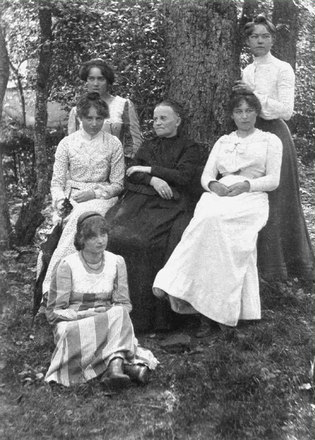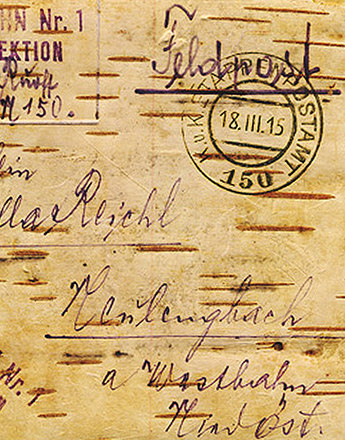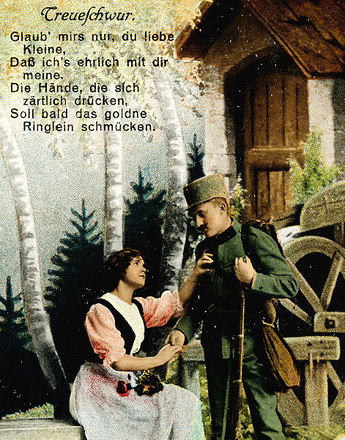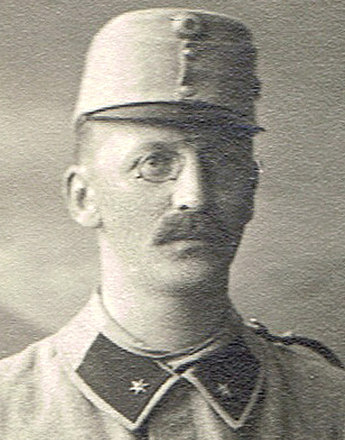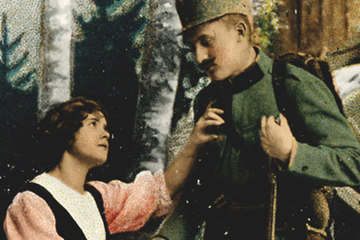Mathilde Hübner was born in Oberhollabrunn in Lower Austria in 1884 as the third of five daughters to Agnes Hübner (née von Coulon) and Gustav Hübner. In 1895 the family moved to the imperial capital Vienna, where Mathilde Hübner became a pupil at a private lower secondary school for girls in the same year. From 1898 she attended a higher secondary school for the daughters of civil servants in Vienna, but left after only a year in order to start professional training to become a teacher, like her parents, the following year.
Having passed the entrance examination, in the autumn of 1899 Mathilde Hübner entered the Imperial and Royal Training Institute for Female Teachers at 14 Hegelgasse, in Vienna’s first municipal district, passing her ‘leaving examination with excellent marks’ in 1903. As the historians Monika Bernold and Johanna Gehmacher have established, ‘this qualified her to become a temporary acting teacher in primary schools and a needlework teacher at primary and lower secondary schools’. After a two-year period of practical service she had to appear before a commission and pass an examination qualifying her to teach at primary schools, which entitled her to tenured employment as a teacher. In 1907 Mathilde Hübner also passed the examination qualifying her to teach at lower secondary schools with honours, which led to tenured employment as a lower secondary school teacher.
From a cultured middle-class background, Mathilde Hübner had been interested from a young age in educational issues, in particular the education of girls and women. As a member and from 1910 to 1914 vice-president of the Allgemeiner Österreichischer Frauenverein (General Austrian Women’s Association), the ‘radical wing’ as Gisela Urban calls it, of the first wave of feminism in Austria, she campaigned for women’s access to educational institutions and professional opportunities which had hitherto been closed to them.
She followed this path herself, endeavouring to be allowed to take the Maturitätsprüfung (higher secondary school leaving examination qualifying an individual to enrol for university-level education) in 1906. Having successfully passed this examination she applied to enrol at the Technische Hochschule (polytechnic university) in Vienna in 1907. After being refused several times she was eventually granted the status of guest auditor two years later, the first woman in Austria to attain this status.
Ottokar Hanzel was born in Ebreichsdorf, near Wiener Neustadt in Lower Austria on 4 November 1879, the son of Monika Hanzel (née Hocke) and Bohuslav Hanzel, a dyer and later factory manager. Having attended a higher vocational school and passed the Maturitätsprüfung, he enrolled to study civil engineering at the Technische Hochschule in Vienna in the autumn of 1899.
The Maturitätsprüfung also allowed him to join the Imperial and Royal Army as a one-year volunteer according to the provisions of the compulsory military service order that had been introduced in Austria-Hungary from the end of 1868. On 23 April 1900 he joined the Fortress Artillery Regiment ‘Kaiser No. 1’. Male citizens who like Ottokar Hanzel had completed higher secondary education or its equivalent were allowed to volunteer for one year’s service instead of the normal period of service which lasted three years. However, for many men this meant that they had to complete their service at their own expense; young men without means could only serve this year at public expense upon application and after demonstrating exceptional aptitude.
In 1904 Ottokar Hanzel passed his examination to become a reserve officer with ‘excellent’ marks and was commissioned as a lieutenant in the reserve in 1905.
Translation: Sophie Kidd
Bernold, Monika/Gehmacher, Johanna: Auto/Biographie und Frauenfrage. Tagebücher, Briefwechsel, Politische Schriften von Mathilde Hanzel-Hübner (1884-1970), Wien 2003
Hämmerle, Christa: Die k. (u.) k. Armee als „Schule des Volkes“? Zur Geschichte der Allgemeinen Wehrpflicht in der multinationalen Habsburgermonarchie (1866 bis 1914/18), in: Jansen, Christian (Hrsg.): Der Bürger als Soldat. Die Militarisierung europäischer Gesellschaften im langen 19. Jahrhundert: ein internationaler Vergleich, Essen 2004, 175-213
Rebhan-Glück, Ines: „Wenn wir nur glücklich wieder beisammen wären …“ Der Krieg, der Frieden und die Liebe am Beispiel der Feldpostkorrespondenz von Mathilde und Ottokar Hanzel (1917/18), Unveröffentlichte Diplomarbeit, Wien 2010
Rebhan-Glück, Ines: Liebe in Zeiten des Krieges. Die Feldpostkorrespondenz eines Wiener Ehepaares (1917/18), in: ÖGL (2012), 56/3, 231–246
Urban, Gisela, Die Entwicklung der österreichischen Frauenbewegung. Im Spiegel der wichtigsten Vereinsgründungen, in: Frauenbewegung, Frauenbildung und Frauenarbeit in Österreich. Hrsg. im Auftrag des Bundes Österreichischer Frauenvereine, Wien 1930, 25-64
Quotes:
„leaving examination with excellent marks“: Bernold, Monika/Gehmacher, Johanna: Auto/Biographie und Frauenfrage. Tagebücher, Briefwechsel, Politische Schriften von Mathilde Hanzel-Hübner (1884-1970), Wien 2003, 49
„qualified her to become a temporary …“: Bernold, Monika/Gehmacher, Johanna: Auto/Biographie und Frauenfrage. Tagebücher, Briefwechsel, Politische Schriften von Mathilde Hanzel-Hübner (1884-1970), Wien 2003, 49
„radical wing“: Urban, Gisela, Die Entwicklung der österreichischen Frauenbewegung. Im Spiegel der wichtigsten Vereinsgründungen, in: Frauenbewegung, Frauenbildung und Frauenarbeit in Österreich. Hrsg. im Auftrag des Bundes Österreichischer Frauenvereine, Wien 1930, 34
„become a reserve officer with excellent marks“: Qualifikationsliste: Österreichisches Staatsarchiv, Abteilung Kriegsarchiv, Personalakten, Pers. Quall: Grundbuchblatt und Qualifikationsliste Ottokar Hanzel. Karton: HANUSZ-HAQUI 961, Bogen 1
Biographical data of Mathilde Hanzel (geb. Hübner) from: Bernold, Monika/Gehmacher, Johanna: Auto/Biographie und Frauenfrage. Tagebücher, Briefwechsel, Politische Schriften von Mathilde Hanzel-Hübner (1884-1970), Wien 2003
-
Chapters
- How does a collection of letters come to be stored in an archive?
- The protagonists: Mathilde Hübner and Ottokar Hanzel
- Love, marriage, career
- The separation begins
- ‘War fever’ versus the longing for peace
- Italy’s ‘betrayal’ in 1915
- ‘… surely this war must end some time?!’
- ‘… and tomorrow we will start cheerily canvassing for peace.’
- Black marketeering, profiteering and self-subsistence
- A love affair in wartime

